Bitcoin
Crypto Volatility Expected as US Releases Key Economic Data
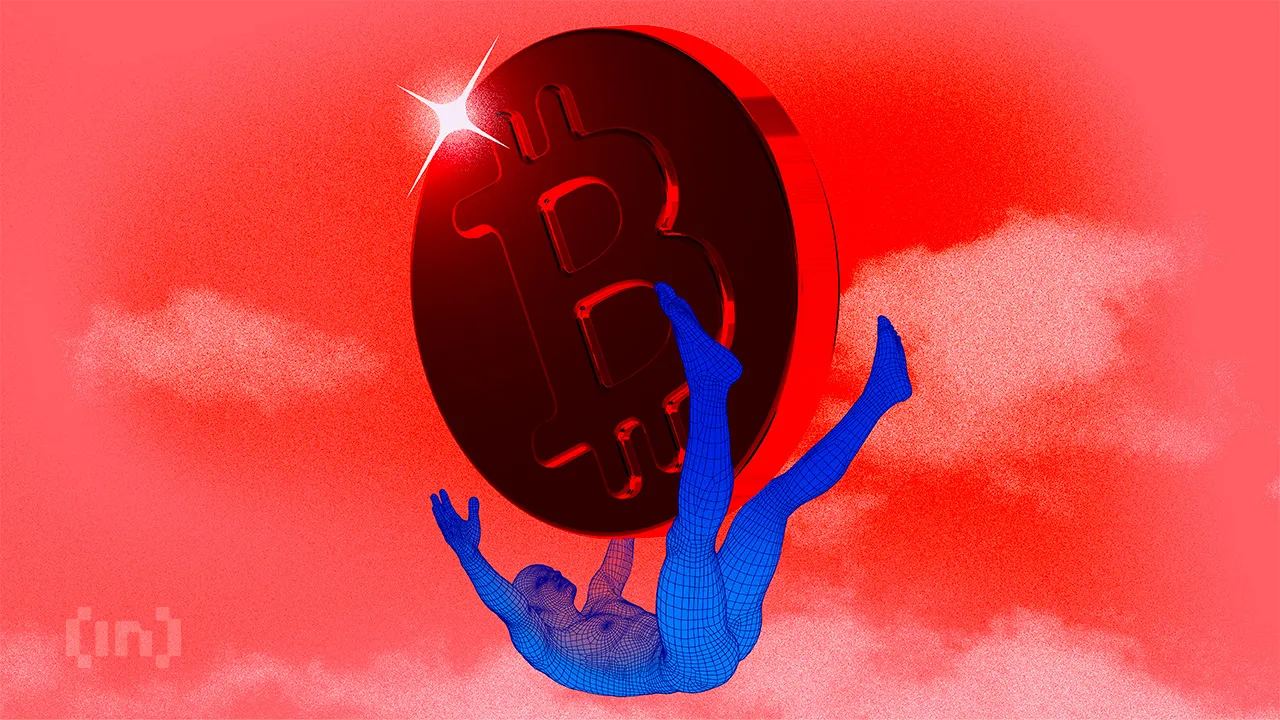
The crypto market’s correlation with key macroeconomic events has returned after dissipating for most of 2023. With the influence back on, crypto market participants must brace for volatility with key releases lined up this week.
In a sentiment-driven market, getting ahead of market-moving economic data releases is critical for traders and investors looking to revise their trading strategies.
What Could Cause Market Volatility This Week
Four events will be of interest to crypto market players this week. They include:
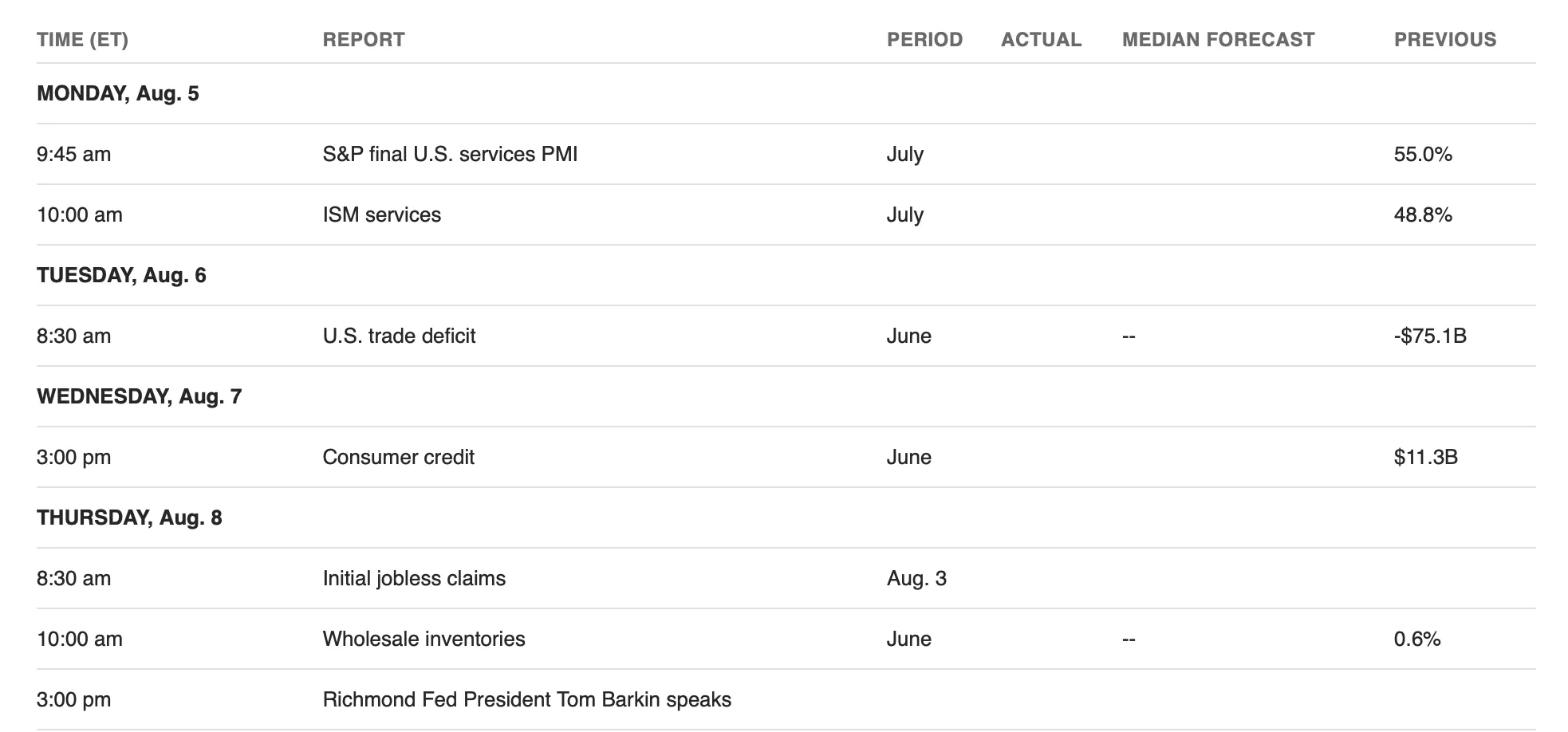
S&P Final US Services PMI
Traders will watch the S&P Global Services PMI on Monday, which is compiled by the S&P Global. Sectors covered include consumer (excluding retail), transport and information, communication, finance, insurance, real estate, and business services.
In July, the S&P Global Services PMI beat expectations of 55, rising to 56 points, higher than June’s 55.3. This indicates expansion in the services sector, a positive sign for traditional markets, showing higher service demand.
US Trade Deficit
Markets also await the US trade deficit on Tuesday, which could cause TradFi and crypto volatility this week. Like the S&P Services PMI, the country’s trade deficit also pointed to increased services in June and more car exports.
The two positive data points to sharp increases in business inflows, reaching their quickest pace in over a year.
“The US is transitioning to a services economy, less manufacturing,” Lumida Wealth CEO Ram Ahluwalia said over positive services data.
Read more: How to Protect Yourself From Inflation Using Cryptocurrency
These lead to increased investment opportunities and improved economic conditions, boosting sentiment in traditional markets like stocks. The impact may not be as direct or significant on crypto compared to traditional markets. However, if the positive trajectory continues, capital could rotate into risk-on assets like crypto.
Positive economic data often influences investor sentiment in the crypto space. As traditional markets strengthen, investors may become more confident in the economy. This could increase risk appetite and lead to greater interest in alternative assets like cryptocurrencies.
Consumer Credit
The US Consumer Credit data for June will be released on Wednesday, July 7. The data reports outstanding credit extended to individuals. The data helps measure conditions in consumer credit markets and analyze the effects of monetary policy. In May’s report, released on July 8, consumer credit increased at a seasonally adjusted annual rate of 2.7%. Revolving credit increased at an annual rate of 6.3%, while non-revolving credit also increased at an annual rate of 1.4%.
The increase in consumer credit indicates that consumers are borrowing and spending more. In traditional finance markets, this is a positive sign for the economy. It suggests consumers are more confident about their financial situation, which explains the willingness to take on debt to make purchases.
If authorities report a similar trend in June, it would stimulate economic activity and drive corporate earnings, leading to higher stock prices. Nevertheless, there is a risk associated with higher consumer credit levels. If consumers become overleveraged and struggle to repay their debts, it could lead to defaults and financial instability.
This could negatively affect traditional finance markets by increasing volatility and investor uncertainty. Crypto, on the other hand, could benefit indirectly from the implied stronger overall economy. Increased economic stability and consumer activity could attract investors to alternative assets like cryptocurrencies.
Richmond Fed President Tom Barkin’s Speech
The Richmond Fed President Tom Barkin will speak on Thursday, August 8, giving insight into policymakers’ thinking and potentially inspiring traditional market and crypto volatility. He will also comment on what recent economic reports mean for future action from the central bank. The Federal Open Market Committee (FOMC) recently decided to keep interest rates unchanged at 5.25%—5.50% for the eighth consecutive meeting.
Jerome Powell, the Federal Reserve (Fed) chair, did not explicitly signal a September rate cut. He demonstrated increasing but cautious optimism about disinflation progress resuming in the second half of 2024.
“He is clearly expecting a correction of some kind or otherwise simply cannot see better investments than Treasury bills. The Fed needs to drop rates. They have been foolish not to have done so already,” X CEO Elon Musk said in a Sunday post.
Musk’s comments came following a lackluster jobs report last week, which raised concerns about an economic slowdown. Meanwhile, Wall Street banks advocate for aggressive interest rate cuts amid evidence that the labor market is cooling. Citigroup economists Veronica Clark and Andrew Hollenhorst, for example, anticipate “half-point rate cuts in September and November and a quarter-point cut in December.”
JPMorgan economist Michael Feroli echoed Clark and Hollenhorst, adding that there’s “a strong case to act” before the next meeting on September 18. According to Feroli, Powell may not “want to add more noise to what has already been an event-filled summer.”
Macro Data Drives Crypto Sell-Off
Meanwhile, crypto volatility has markets bleeding, with the total market capitalization down a stark 12%. Bitcoin is down 12.35%, trading for $53,000 at the time of writing, while Ethereum lost 20%.
Some ascribe the crash to the Japanese stock market suffering its worst losses since 1987. Market analyst Zach Jones associates the crash with Japan defending its Yen currency and dumping all of its Treasury Holdings (US-owned debt).
“Japan created an everything bubble in the 80’s/90’s. The bubble got so big that in the 30-40 years since their stock market has never gotten close to the highs of the bubble. The US economy has a 122% debt to GDP ratio which is insane. Japan has doubled that. They were between a rock and a hard place, either letting their currency collapse and experience a Great Depression-esque collapse or printing money and hyperinflating their currency. They chose to print hundreds of billions of dollars per day to defend their currency. This has been an inevitability to anyone who pays attention to markets,” Jones wrote.
Read more: How To Buy Bitcoin (BTC) and Everything You Need To Know
Elsewhere, Republic ticket nominee for the November elections, Donald Trump, blames the recent financial markets crash on Kamala Harris, Joe Biden, and “inept US leadership.”
Disclaimer
In adherence to the Trust Project guidelines, BeInCrypto is committed to unbiased, transparent reporting. This news article aims to provide accurate, timely information. However, readers are advised to verify facts independently and consult with a professional before making any decisions based on this content. Please note that our Terms and Conditions, Privacy Policy, and Disclaimers have been updated.
Bitcoin
Bitcoin Drops as China Escalates Trade War With 34% Tariff on US

On April 4, 2025, China responded to the latest US tariff imposition by imposing an additional 34% tariff on all goods imported from the US. This escalates the already tense trade war between the two largest economies in the world.
Bitcoin dropped 3% within hours of the announcement, briefly falling below $82,000. This latest development has caused concern among investors, analysts, and participants in the cryptocurrency sector about its potential impact.
Bitcoin Investors Worry About The Escalating Trade War
According to Xinhua News Agency, China will impose a 34% tariff on all products imported from the US starting April 10. Xinhua reported that the US’s “Reciprocal Tariff” violated WTO rules, severely damaging the legal and legitimate rights of WTO members and undermining the multilateral trade system and the international trade order based on rules.
“This is a typical act of unilateral hegemony that harms the stability of the global economic and trade order. China firmly opposes this,” The spokesperson for the Ministry of Commerce said in an interview about China’s lawsuit against the US’s “Reciprocal Tariff” at the WTO.
Previously, President Trump had imposed a 34% tariff on China in addition to the 20% tariffs already imposed in two phases. This means a total of 54% tariffs were applied to China.
News from China has caused concern among crypto investors. On April 4, Bitcoin’s price dropped from $84,600 to $82,000, a 3% decrease.
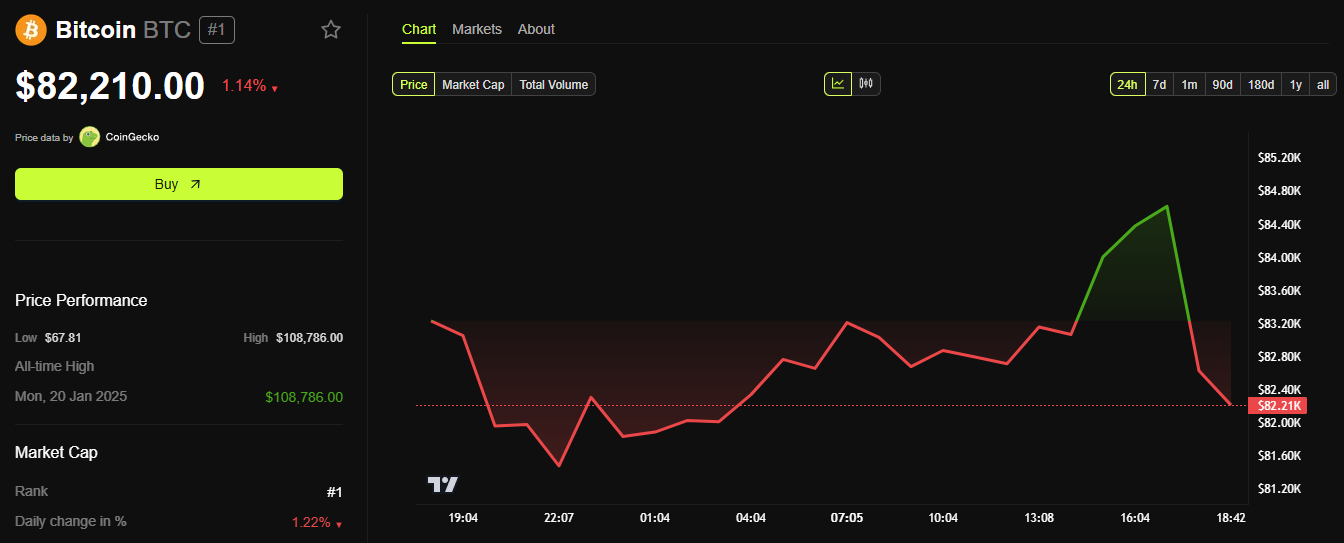
At the same time, following the news, the Long/Short ratio of Bitcoin dropped below 1, indicating a growing sentiment for short-selling, which has become dominant in the market.

Both Bitcoin and other markets have been affected. The S&P 500 fell from 5,260 points to 5,250 points, while the Dow Jones Industrial Average dropped from 41,100 points to 40,500 points. China’s actions have raised concerns about the potential escalation of the global trade war.
“The ‘Third World War’ of the trade war has begun,” The Kobeissi Letter commented.
What Will Happen to Bitcoin When The US-China Trade War Escalates?
This cryptocurrency, often praised as a hedge against economic instability, tends to behave like a risky asset during sudden uncertain periods. Historical patterns support this reaction—during the US-China trade war in 2018-2019, Bitcoin experienced significant sell-offs as tariffs escalated, only recovering when the narrative of value preservation took precedence.
A significant portion of the global cryptocurrency hardware supply chain comes from China, where companies like Bitmain dominate the production of ASIC mining machines—important devices for Bitcoin mining.
With the US now facing a 34% tariff on technology imports from China, the cost of importing these mining machines is expected to rise dramatically. Bitcoin miners in the US, already facing high energy costs and competitive pressure on hashrate, may see their profits shrink further.
However, the long-term outlook for Bitcoin may not be as bleak as the initial market reaction. Some analysts suggest that prolonged trade wars and economic friction could enhance Bitcoin’s appeal as a decentralized asset unaffected by government intervention. If tariffs lead to inflation or weaken fiat currencies like the USD, investors may turn to cryptocurrencies as a safe haven.
“It’s not gold, and it’s not the yen. Instead, Bitcoin is emerging as a risk-dynamic asset – one that doesn’t crumble like high-growth stocks but also doesn’t attract the same flight-to-safety flows as traditional safe havens,” Nexo Dispatch Editor Stella Zlatarev told BeInCrypto.
This sentiment aligns with research indicating that instability often causes initial price drops but can pave the way for growth as acceptance increases.
Disclaimer
In adherence to the Trust Project guidelines, BeInCrypto is committed to unbiased, transparent reporting. This news article aims to provide accurate, timely information. However, readers are advised to verify facts independently and consult with a professional before making any decisions based on this content. Please note that our Terms and Conditions, Privacy Policy, and Disclaimers have been updated.
Bitcoin
Fresh $36M Bitcoin Transfer By Bhutan Sparks Speculation—Dump Alert?
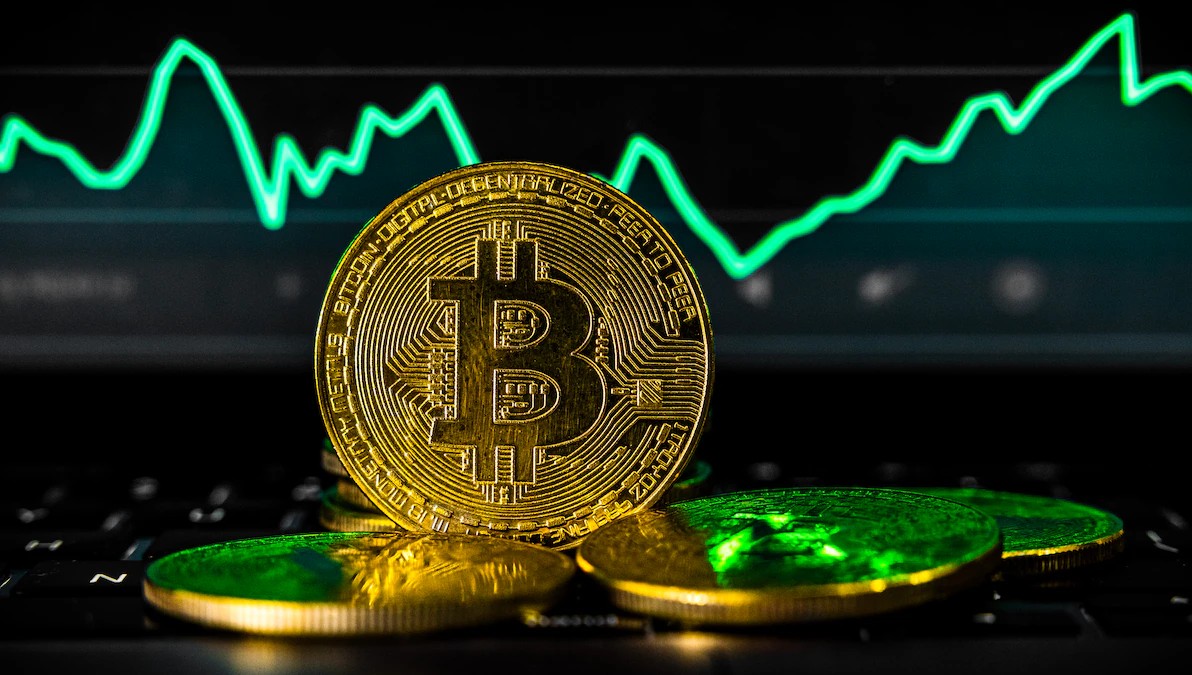

A series of Bitcoin transfers from wallets linked to the Bhutanese government has caught the attention of cryptocurrency watchers. According to blockchain data from Arkham, addresses tied to Druk Holdings, the commercial arm of Bhutan’s government, moved 419.5 Bitcoin worth approximately $34.51 million to an unidentified address on April 2.
Government Wallets Transfer Large Sum To New Address
Based on reports from Arkham, a blockchain analytics platform, two separate wallets believed to belong to the Bhutanese government participated in the transfer. The main Bitcoin holding wallet sent 377.8 BTC ($32.11 million) to a new address identified only as “bc1qn6.” A second wallet, labeled “34oXLr,” contributed an additional 41.7 BTC ($3.5 million) to the same destination.
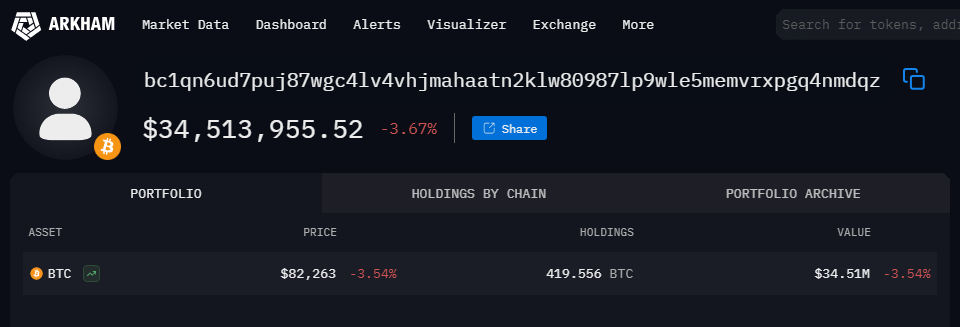

Source: Arkham
The funds remain in the new wallet at the time of this report. This movement follows a larger transfer last week when the government reportedly shifted 1,664 BTC ($144.57 million) to several different addresses.
Bhutan Maintains Significant Crypto Holdings
The Royal Government of Bhutan owns significant Bitcoin holdings, despite recent sales. Bhutan, based on Bitcoin Treasuries data, owns 13,029 BTC at a value of $1,061,269,247. This puts the nation fourth in total Bitcoin owned among countries, just behind El Salvador.

Source: Bitcoin Treasuries
The landlocked Buddhist-majority country has emerged as an offbeat contributor to the cryptocurrency world. Bhutan reportedly mines Bitcoin by leveraging its abundant hydroelectric resources. This most recent stockpile of cryptocurrency constitutes a sizable portion of the total economy — 31% of the country’s gross domestic product (GDP), estimated at nearly $3 billion.
Market Response Following The News
The cryptocurrency market appears unaffected by Bhutan’s Bitcoin movements. According to price data, Bitcoin recovered from a low of $81,014 to reach $82,005 before slightly pulling back. This represents a 2.5% rebound within a day.
The leading cryptocurrency traded at $82,401 at the time of the report, showing a nearly 1% increase over 24 hours. If this upward trend continues, Bitcoin could achieve its third consecutive positive daily close for the first time since early January.
While Bhutan has been selling off its Bitcoin for profit, the United States is seeking to stop all sales of their balance and even expand it. Interestingly, US President Donald Trump signed an executive order last month to establish a strategic Bitcoin reserve for the nation. In the meantime, senator Cynthia Lummis has filed the Bitcoin Act, seeking to acquire 1 million BTC for the nation.
Featured image from AD, chart from TradingView

Editorial Process for bitcoinist is centered on delivering thoroughly researched, accurate, and unbiased content. We uphold strict sourcing standards, and each page undergoes diligent review by our team of top technology experts and seasoned editors. This process ensures the integrity, relevance, and value of our content for our readers.
Bitcoin
Japanese Company Unveils Plans To Buy Crypto


Enish, a Japanese game developer, plans to buy Bitcoin worth 100 million yen. The company announced this move as part of its growing work with blockchain technology, according to recent reports. This purchase comes at a time when Bitcoin was trading at $81,800, based on CoinGecko data.
Why Enish Is Buying Bitcoin Now
The gaming company’s interest in Bitcoin stems from its work on blockchain games. Enish believes owning Bitcoin will help them better understand the technology behind it. Their game “De Lithe Last Metsoires” already uses blockchain features.
Bitcoin stands as the most well-known cryptocurrency in the market. By owning it, Enish hopes to gain new insights for their technical teams. The company thinks this knowledge will improve how they make games and run their business.
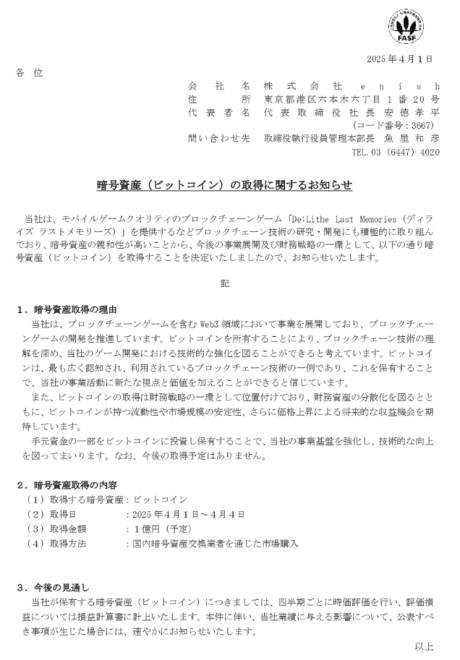
Notice regarding the procurement of Bitcoin. Source: Enish
How And When The Purchase Will Happen
Enish has set clear dates for buying Bitcoin. They plan to make their purchase between April 1 and April 4, 2025. The company will spend 100 million yen through normal market buys on Japanese cryptocurrency exchanges.
JUST IN: PUBLIC JAPANESE GAME DEVELOPER ENISH JUST BOUGHT ¥100 MILLION WORTH OF #BITCOIN
ANOTHER BTC TREASURY 🙌 pic.twitter.com/F2A94hBtFh
— The Bitcoin Historian (@pete_rizzo_) April 2, 2025
This action also aligns with Enish’s asset management strategy. They are looking to diversify their holdings while setting themselves up for potential profits if Bitcoin’s value increases further. The company chose Bitcoin because it’s simple to purchase and sell, and has a big, stable market.
Other Companies Joining The Bitcoin Trend
Enish isn’t alone in buying Bitcoin. Data from CryptoQuant shows public companies added 91,780 Bitcoin to their holdings during the first quarter of 2025.
Tether added nearly 9,000 Bitcoin to its accounts, bringing its total to 92,640 Bitcoin. MicroStrategy (now Strategy), known for its heavy Bitcoin investments, bought another 81,780 Bitcoin. This latest purchase cost the company over $8 billion.
Smaller Players Also Making Bitcoin Moves
More recently, several smaller companies have purchased Bitcoin. Looking more closely at some of these purchases: The Blockchain Company bought 600 Bitcoin. Semler Scientific bought 1,100. Metaplanet also acquired 2,280 Bitcoin in a bigger purchase.
But some companies are raising money to purchase even more. Marathon Digital is raising funds by selling stocks to invest in Bitcoin. In November, GameStop submitted a $1.3 billion offering to initiate its own Bitcoin strategy.
The trend demonstrates increasing acceptance of cryptocurrency among businesses, with more companies diversifying into Bitcoin—often for the same reasons as Enish: blockchain adoption, digital currency growth, and future holdings.
Featured image from Pexels, chart from TradingView

Editorial Process for bitcoinist is centered on delivering thoroughly researched, accurate, and unbiased content. We uphold strict sourcing standards, and each page undergoes diligent review by our team of top technology experts and seasoned editors. This process ensures the integrity, relevance, and value of our content for our readers.
-

 Market24 hours ago
Market24 hours agoBitcoin’s Future After Trump Tariffs
-

 Regulation22 hours ago
Regulation22 hours agoUS Senate Banking Committee Approves Paul Atkins Nomination For SEC Chair Role
-

 Market21 hours ago
Market21 hours agoBinance Managed 94% of All Crypto Airdrops and Staking Rewards
-
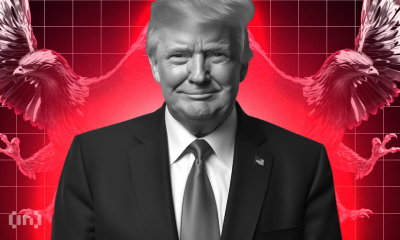
 Market23 hours ago
Market23 hours agoTRUMP Token Hits Record Low Due To Liberation Day Tariffs
-

 Market22 hours ago
Market22 hours agoPi Network Price Falls To Record New Low Amid Weak Inflows
-

 Regulation19 hours ago
Regulation19 hours agoUS SEC Acknowledges Fidelity’s Filing for Solana ETF
-

 Market20 hours ago
Market20 hours agoXRP Battle Between Bulls And Bears Hinges On $1.97 – What To Expect
-

 Market19 hours ago
Market19 hours agoRipple Shifts $1B in XRP Amid Growing Bearish Pressure





















